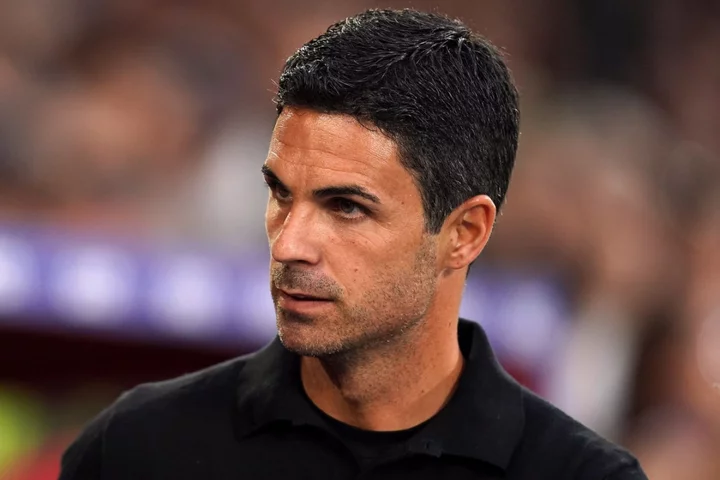
Mikel Arteta keen to end Arsenal’s Everton hoodoo despite ’emotional connection’
Mikel Arteta admitted he has an emotional connection with Everton and expects his former side to put up a battle when Arsenal travel to Goodison Park in the Premier League on Sunday. Arsenal reignite their Premier League bid with a trip to Merseyside where they face Sean Dyche’s Everton, who are unbeaten at home against the Gunners since 2017. Arteta praised his former side’s attributes and highlighted the special connection between himself and the Toffees. “I’m really excited about it, the last six years we have not won there so we are going to have to earn it,” Arteta said. “We know we are going to have to be at our best to beat them there and that’s something we haven’t managed to do so that’s where we are going to start. “It is a big emotional connection I have to that football club with many years I spent there, the incredible memories that I have so I’m always grateful. It’s a big part of my playing career and as a coach I have to play against them and we have to beat them. “We’ve been here and we’ve been to grounds before where we haven’t won before and we’ve done it so it’s about understanding the importance and knowing what we lacked in those games and putting it right. “Sometimes you cannot avoid a battle (with Everton), the style of play they have is very clear and they’re very good at that. “We have a different one and it’s about trying to impose your way of playing and the tactic is just to make sure your opponent’s strengths are hiding and that ours are coming out every single time to fulfill the potential of your players, and that’s what I think both managers and players will try to do.” Arsenal’s Champions League opener against PSV next week is their first time back in the competition since the 2016-17 season. The Spaniard embraced the challenge of a difficult schedule alongside another battle with Manchester City at the summit of the Premier League this season. “We played three games a week last year, but the Champions League is obviously different with the expectations and that we’ve been away from it for seven years,” he added. “It’s excitement, this is where we want to be and when you look at the fixtures and the games we are going to have to play, I think everyone is really looking forward to it.” Arsenal terminated Nicolas Pepe’s contract on Saturday after the Ivorian failed to hold down a starting role at the Emirates since his reported £72 million move – then a club-record fee – in 2019. Arteta said: “What I can say is that he’s a phenomenal boy, he trained really hard, it’s not his fault that the amount of money we paid at the time. “When things aren’t working out you have to move on and there’s no point when things aren’t working either way. “The decisions has been made and I think it’s in the benefit of both parties.” Read More Charity boss speaks out over ‘traumatic’ encounter with royal aide Ukraine war’s heaviest fight rages in east - follow live Ange Postecoglou says Tottenham will give support to troubled Richarlison Ireland braced for ‘big step up’ ahead of facing Tonga’s ‘serious threats’ Erik ten Hag says he inherited Manchester United with ‘no good culture’
1970-01-01 08:00
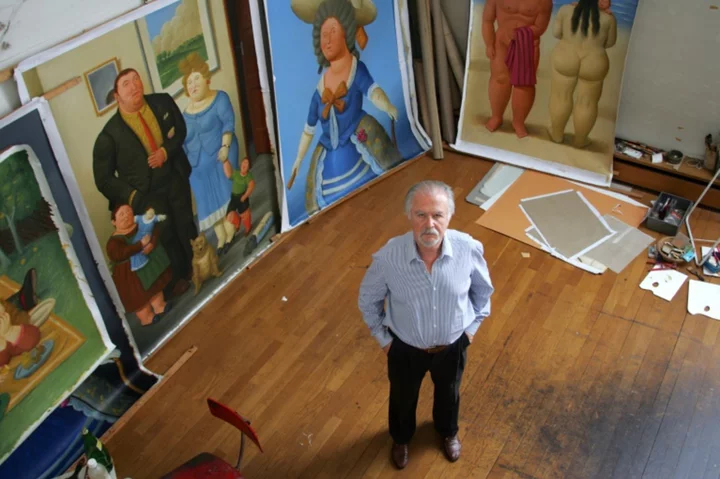
Colombian artist Fernando Botero, who inflated beauty and pain, dies at 91
Colombia's most famous artist, Fernando Botero, who was known for his voluptuous depictions of people and animals, has died aged 91...
1970-01-01 08:00

Monaco names new finance minister after money laundering rebuke
Monaco on Friday named a new finance and economy minister, following a rebuke from the Council of Europe earlier this year over shortcomings in...
1970-01-01 08:00

Wrestler Will Ospreay speaks on tattoo of wrong AEW Wembley stats: "Worst day of my life"
Professional wrestler Will Ospreay has spoken about a regretful tattoo he got after competing at AEW's All In show at Wembley Stadium, where the wrong attendance was announced. The show which happened on August 27th, was believed at the time to be a world record for a wrestling show with 81,035 fans in attendance at the historic venue London. However, it has since been reported by Wrestlenomics that the actual number of people that went through the Wembley turnstiles on the day was only 72,265, as per data provided by Brent Civic Centre. Although AEW did sell 81,035 tickets for the show the actual attendance means that it doesn't have the record for a wrestling show, that still belongs to WWE's WrestleMania 32 at the AT&T Stadium in Texas in 2016. It also doesn't have the record for a wrestling show at Wembley Stadium either which is still held by WWE for their SummerSlam 1992 show with 78,927 fans in attendance. Aside from being an unfortunate error for AEW (the 'record' number was read out at the show) its even more embarrassing for Ospreay who got a tattoo of the stat on his arm to commemorate partaking in the show. Ospreay is regarded as one of the best wrestlers in the world and was the highest-profile British wrestler on the show, defeating Chris Jericho on the night. In a video the star uploaded then quickly deleted, Ospreay jokingly bemoaned the incorrect number which he now has on his arm, which is incidentally the first tattoo he's ever gotten. The 30-year-old said: "Bruv, you cannot make this f**king sh*t up. I am currently in Japan and I’ve had no f*cking sleep. I am tired and I wake up. This is the worst f*cking day of my life. Do you know how hard it was for me to get a tattoo? My Mum f**king hates them bruv. They announced it to everyone! They announced it was 81,000 people. I’ve got this f**king thing on my arm now." Commiserations Will but there is always a chance that he could appear at the show next year as AEW have announced that they will be returning to Wembley on August Bank Holiday weekend in 2024. Sign up for our free Indy100 weekly newsletter Have your say in our news democracy. Click the upvote icon at the top of the page to help raise this article through the indy100 rankings.
1970-01-01 08:00
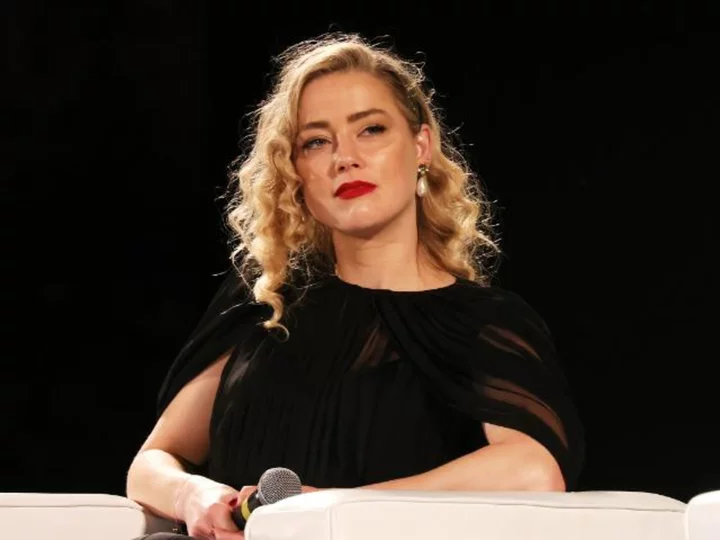
Amber Heard: Blink and you miss her in 'Aquaman 2' trailer
Amber Heard's character had a big part in the 2018 film "Aquaman."
1970-01-01 08:00

Alisson Becker wins August 2023 Castrol Save of the Month award
Alisson Becker has won the first Castrol Save of the Month award of the 2023/24 season thanks to his stunning stop in Liverpool's dramatic win over Newcastle United.
1970-01-01 08:00

Get Your Hands On Uniqlo’s Newest Collaboration While You Can
We all know Uniqlo for its sleek and simple clothing and accessories. Japanese casual wear is always fashionable but nearly never trendy (which is not a diss, by the way — all the cool kids wear Uniqlo and its many collabs). The classic pieces are the building blocks of a high-quality, long-lasting wardrobe. And that’s even more true for the brand’s LifeWear collection, a range of elevated everyday essentials, which is soon to get refreshed through a collaboration with British designer Clare Waight Keller.
1970-01-01 08:00
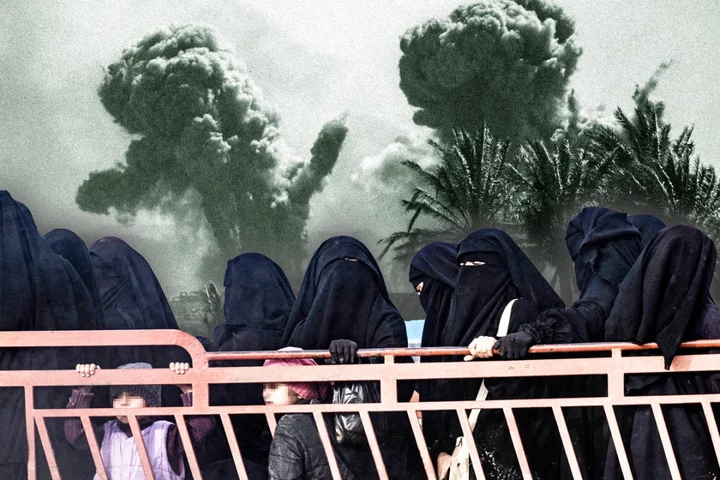
She was forced to live under Isis in Syria as a child and then stuck in a refugee camp. Finally she is home
In a courtyard in the shadow of Tirana’s largest mosque sits Emina. A gloved hand reaches out for a can of Pepsi, which she sips as she watches the city around her. Although she was born in Tirana, it is unfamiliar: her formative years, and most of her memories, were shaped in Baghuz and Raqqa, in Syria. Both cities were held for years by the jihadist group Isis, known locally as Daesh. Emina has been back in Tirana for just a month. She is still only 16. A quiet and withdrawn figure; her soft voice is barely audible. Life in Albania is a new and difficult adjustment, but she is certain that leaving Syria was the right decision. "Life is much better here, so much better than where I was”. Emina is accompanied by her grandmother and cousin. All three are wary of having their photographs taken, given what they have been through. They are a religious family: both wear the hijab, rather than a burqa like Emina. Her grandmother, a woman in her 70s, lived under the communist regime of Albanian former leader Enver Hoxha, when religion was banned by the state. Both forms of dress are still uncommon in Albania. The bright pastels of their hijabs contrast with Emina’s black burqa, a mark of the practice of two very different forms of Islam. Emina was taken to Syria as a young child by her mother and father, in 2015. For almost nine years of her life she was in Syria, first in Raqqa, then in Baghuz – the last stronghold of Isis in the country – and then, after it fell in 2019, in Al Hol, the refugee camp which is filled with the wives and children of Isis fighters. “Life in Baghuz felt normal, because I was so young, and we never left the house, " Emina says. "For a year, the war seemed far away”. But the war found them, as wars do. Baghuz was the final town of the once-vast caliphate to fall, following a month-long assault by coalition fighters aided by American airstrikes. Her father died in the battle. Emina, her mother and her sister were then moved to Al Hol. By some estimates, there are more than 50,000 women and children in the Al Hol camp. It is guarded by the Syrian Democratic Forces (SDF), made up of mostly Kurdish forces. They also guard the thousands of former fighters, both foreign and local, who languish in prisons in northeastern Syria. Albania's government has offered a way back for any Albanian citizen who wants to leave the camp: the women who remain there all know how they can alert the authorities and begin their journey home. If they do so, they are moved to the Al Roj camp, about 50 miles north, where their name and details are recorded. From Al Roj, the authorities take them home to Albania. In leaving Al Hol, towards the end of 2022, Emina abandoned her mother and sister. She has likely destroyed any future relationship with them and may never see them again. They did not want her to leave; they remain convinced Isis will rise from the ashes. They are not alone. Masoud Mostajabi, deputy director of the Middle East programmes at the Atlantic Council think tank, believes Isis will once again terrorise the region. Yet, distracted governments have little time for these warnings. The US has “done a great job at convincing itself that the threat from Isis is gone,” Mostajabi says, “but on the ground, authorities fear a revival”. In Tirana, the love and concern Emina's grandmother and cousin have for her is clear from the way they watch her as she speaks; there is great sadness in their eyes as she describes her time in Syria – but they still smile at her for encouragement. It is difficult to comprehend the level of suffering this slight girl has faced. Emina’s grandmother is the most talkative of the three: speaking with conviction about the suffering of their family, and how Emina has been treated upon her return. Her eyes fill with tears as she speaks: “Above all, the Albanian government practises a human approach. They see her as a real person”. It is impossible to commit to bringing back all who live in the Syrian camps, not least as some wish to stay. But the Albanian government has tried hard to ensure that there is a path for all women and children who wish to return. It is a marked difference with the British government, which has not given British citizens a pathway to return from Syria. Only in October 2022 was a British woman – who has not been named – allowed to return from Al Hol: she is the first and only adult returnee since the fall of Isis. Three children have been returned. It is estimated that around 60 Britons, including 35 children, still remain in Syria. In other cases, the British government has made leaving Syria impossible: the most famous example being Shamima Begum, who left Britain at 15 to join Isis. She has had her British citizenship revoked, on the grounds that she can claim citizenship in Bangladesh. (It is against international law to render an individual stateless). The Bangladeshi government has disputed this and said that Begum cannot enter Bangladesh. In 2019, the foreign minister, Abdul Momen, said that were she to try and enter, she would face the death penalty. Almost all European countries initially refused to return their citizens from Al Hol. But in the years since, some have slowly relented. A decision by the European Court of Human Rights may have been a factor: in late October 2022, the court ruled in favour of two French women who had argued that the French government’s refusal to bring them home violated their right to enter the territory of their nationality. The French government lost the case and were forced to re-examine the cases of both women. The ruling did not stipulate that all citizens must be returned, just that an independent body should examine cases. Life in Baghuz felt normal, because I was so young, and we never left the house Emina, talking about the start of her life under Isis The ruling may have pushed France to act: a week later, it repatriated 55 of its citizens. In January, it repatriated another 47 people. Canada and Australia have recently repatriated a number of their citizens, after refusing to do so for quite some time. Britain, by continuing to ignore its citizens in Syria, may become an international outlier. The British citizens who remain in Al Hol are despondent. Julian Kasapi, who visited the camp, said a British woman pleaded for help when she realised he could speak English: “no one is coming for me”, she told him. Emina spoke of three orphans, British children, who would wander around the camp by themselves. Albanians who choose to stay in Al Hol say they fear what awaits them at home, according to those who have visited the camps. Those who remain in Al Hol are watched over by the most devout women there, those who are still firmly committed to the extremist Isis ideology, and believe that that Isis will inevitably rise again. Some of these women are likely to have been recruiters, or more involved in the organisation. (Women and children from Syria and Iraq are housed in a separate part of Al Hol.) Their watchful eye means that no woman in the camp is safe to remove a burqa, even to wear a hijab. To do so would be a statement of disbelief, and would put a woman’s life in danger. Emina was watched over by such devout Albanian women, with whom she shared a tent. “They tell you that when you return to Albania, you will not be able to practise Islam”, she says. The women who watched over Emina told her that a life in Albania would mean certain isolation, imprisonment and loneliness. She did not believe them, and knew she wanted to return home. “When I made the decision to leave, at first they told me not to go. Then, they told me they would kill me’. Some girls have spent most of their life under Isis or within the camps: what they are told about the outside world can seem real, because they have so little experience of it. Indrit Doda, who leads the anti-terror unit in the Albanian police, was involved in missions to help return Albanian women and children from Al Hol. “We spent hours in negotiations with them, trying to convince them that they would be safe if they returned home”, he says, “it was very hard to get through to them”. Although the camps are in northeastern Syria, they are controlled by Kurdish forces rather than the Syrian government. “It was very difficult at the beginning”, says Doda. “Albania is not a big player on the international stage. We did not have established means of communication with the right groups in the Middle East”. Rounds of negotiations took them to Lebanon and elsewhere. But they persisted, and eventually established a route for Albanian women and children to return home from the camps in Syria, if they so desired. Back in Tirana, it is clear that any fears over safety are unfounded. The government prides itself on its efforts to bring home and re-integrate women and children who have lived under Isis. Much is put into ensuring those who return may re-integrate into society successfully. As soon as they arrive, their health and psychological state are reviewed. Both women and children receive psychotherapy for as long as is deemed necessary. For children, there is a focus on their education: they are not allowed to attend religious schools. They are assigned a teacher within their school to help with their reintegration, and receive extra lessons. “Many of them were out of school for years,” says Fatilda Smajlaj, who runs the reintegration programme within the Albanian government. To ensure they are not isolated in the school they attend, only their teacher and the headteacher are aware that they lived under Isis. Their reception from the government, and society at large, tends toward sympathy. Many are believed to have been tricked into going by their husbands (although in the case of Emina's mother she left willingly). Yet even women who choose to come back may still hold radical views and may not be reconciled to life in a secular country. They have chosen to return for the sake of their children's’ future, but they are still bitter about what they have been through: they have lived under bombing campaigns and as prisoners in the desert. Mothers who are still radicalised can do serious harm to their childrens’ reintegration. Fatilda speaks of women who would tear out the eyes of their child’s toys, burn their drawings and ban them from listening to music, because they believed they were ungodly. It is harder to work with them as they are more aware of their own suffering than their children. It is difficult to know how to measure success. The government puts women into programmes which teach them economic empowerment, and gets them back into education. For some, success is abandoning Islam altogether. Fatilda speaks of a family with three daughters, all of whom were wearing the burqa. They no longer wished to practice Islam but refused to abandon their burqas unless their mother did so as well. Eventually, she agreed. “She has now integrated into Albanian society,” Fatilda says, and has gone back into education:, “this is a story of success”. For others, success is about learning to live in Albania and practice their faith. The government has put great efforts into consulting with local Imams to ensure that reintegration is palatable for those who wish to retain their devotion. “The Imams help address the way women think about Islam,” says Fatilda. As they have lived under such a strict religious doctrine it is often difficult for them to adapt to life as a religious person in a secular country. Under Communist rule, Albania was an atheist state. Religious beliefs were completely banned under the constitution. Even the Soviet Union (which made great efforts to eliminate religion) never banned it entirely. As in many former Communist states, religion has been re-adopted. Albania is more than 50 per cent Muslim, and there is a significant Christian population. Religion is celebrated in Albania for its cultural traditions, rather than its moral guidelines. Christians and Muslims will celebrate each other's festivals. Devout religious practice is uncommon in Albania. This is why many who return fear they will be ostracised if they continue to practice a stricter form of Islam than is typical. These fears are unjustified, according to Emina’s family. Emina's fate differed from that of another girl, Drita. She is 18, and like Emina, has spent most of her childhood in Syria. Drita’s uncle, Gentijan, lives in Tirana and has spent years trying to bring her home. He believes that it is the influence of the women who have chosen to stay in Al Hol that has meant Drita has chosen to do the same, even though she has been given the option to return to Albania. Drita and her brother, Altin, were taken to Syria as children by their father. They believe he became radicalised after working for a short period as a plumber in Saudi Arabia. When he returned, he had changed completely: he stopped drinking and avoided his friends. But he remained a kind husband and was still devoted to their family, according to Gentijan. “It was an act, of course, to keep us from being suspicious,” he says. In January 2014, he told his wife he was taking the children on holiday to Montenegro, but instead took them to southern Turkey, where they crossed into Syria. The children were six and seven years old at the time. By the end of summer, he was dead. The children were left alone. Word reached the rest of the family that the children’s father had died. Yet Isis were still in control and there was no way for the children to leave. And they were still very young: too young to understand their circumstances, and what it would mean to be raised as an orphan in a country thousands of miles from home. This was not lost on their grandmother, Bleona, back in Albania. For them, she made a great sacrifice: she chose to leave for Syria to live with them. She had never been a religious woman, yet she donned a burqa and chose to live under the rule of Isis, so her grandchildren would not have to do so alone. When Isis was forced out in 2019, Altin, Drita and their grandmother were moved to Al Hol. Here they waited, hoping that the government might be able to bring them home to Albania. By 2021, they had been in Syria for seven years. But by the time the path was cleared for them to do so, their grandmother had died suddenly. She had been a healthy woman in her 60s, with no previous health concerns. Her death is a testament to the terrible conditions in Al Hol. Its residents live in dire poverty, with little access to medical care. Disease is common. Soon after, the children decided to return home. But while they were waiting on legal guarantees from the government, Drita, seemingly embittered and saddened by the death of her grandmother, changed her mind. She chose to stay, and remains in Al Hol. Drita occasionally sends her uncle messages on WhatsApp. The messages are short, sporadic, and to the point: “I am fine” one reads. It might be weeks between messages., Gentijan knows her communications are likely being watched, because the phone she texts them from belongs to another woman – famed for her extremist beliefs among Albanians in Syria – who has chosen to stay in Al Hol. “She can’t speak openly. She cannot express her concerns because she fears the other women with her”. Gentijan believes she wants to return home, but fears about what would happen if she tried to leave. “She keeps her life together by playing an act of wanting to stay there,” he says. In a conversation where he believed she was speaking openly, she told him that she never imagined she could have suffered so much in life. But if she expressed a will to return, Gentijian believes she would risk being killed: “They have no respect for human life whatsoever”. To the credit of the Albanian government, they have visited Al Hol three times to try and return her. But she would not come. The longer people spend in the Al Hol camp, the more dangerous it is for the countries they might return to, according to Emina. They risk becoming re-radicalised, and “every day they are there, they risk their life”. She says that any unaccompanied children are preyed upon by the most radical who remain. The danger incentivises children to seek refuge from anyone who might look after them. “Two weeks after I left Al Hol, two children in the camp were murdered,” says Emina. Returning women (and their children) from Syria is controversial: while some see them as terrorists, in others they inspire sympathy. Many women can claim to have stayed home: the only parts of the caliphate they knew well were between the four walls of their home. They cooked and cleaned, and as some claim, lived a life entirely separated from the terror that reigned outside. All those who remain in Syria are an unfair burden upon the SDF as they still pose a significant threat to the region. In February, US Senators described the camps as “hotbeds for radicalisation”. In late November, Turkish strikes in the region threatened their existence altogether: the SDF said they would no longer have the capacity to guard the compounds if Turkey launched an incursion in northeastern Syria. Repatriating Isis fighters to face prosecution in their home countries is even more unpopular than repatriating their wives and children. It would also be difficult to prosecute fighters for the particular crimes they have committed: collecting evidence may be challenging, expensive or impossible. Few countries have tried to bring home fighters, even Albania has not repatriated any. It is an issue that all countries will have to deal with eventually – leaving them in Syria may be politically convenient, but is not viable in the long term. Many European countries have avoided repatriating them because they would rather not deal with the consequences of doing so: trials, prisons and reintegration are all expensive. Those who remain in Syria pose a threat to the region, and a greater threat to their home countries the longer they are kept there. Bringing home women and children is a step in the right direction. The number of Albanians who left for Syria is naturally much smaller than those from Britain, France or other large European states; its population is around 2.8 million. The process of bringing women and children home, and eventually re-integrating them into society, is simpler when their numbers are smaller. But it is also true that Albania is a considerably less wealthy country than many of its European neighbours. Even with its smaller state capacity and international presence it has managed to repatriate and re-integrate women and children into Albanian society. Albania shows that if a government is determined enough, it can return its citizens. Emina is an example of the happiness that can come about through repatriation. That her sister and mother choose to stay in Syria is painful for her and her family. Like many of the others who remain, they believe the lies they are told about how they will be treated if they return to Albania. But her presence helps alleviate her family’s suffering. “There is nothing more beautiful than having her home,” her grandmother says through tears. Emina's return gives her the ability to choose the direction of her life, rather than have it decided for her as she wastes her youth in a tent in the desert. She has freedom, she has an education, and she has her religion: she is living proof that the lies women are told by some in Al Hol are unfounded. Read More They were murdered by Albania’s communist regime. Three decades on, families are still searching for their remains Ukraine war: ‘Significant losses’ for Russia as Kyiv retakes village and hits ships Apple will update iPhone 12 in France after regulators said it emitted too much radiation Volodymyr Zelensky set to meet Joe Biden in Washington in his second trip since war
1970-01-01 08:00
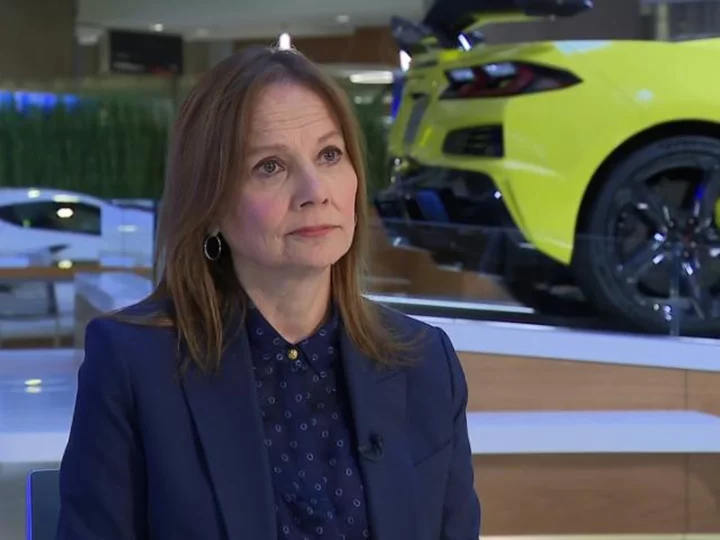
GM CEO Marry Barra tells CNN she's 'frustrated' about the strike
General Motors CEO Mary Barra said she's "frustrated" with the autoworker strike that began overnight, and said that her company has a "very compelling offer" for the union.
1970-01-01 08:00
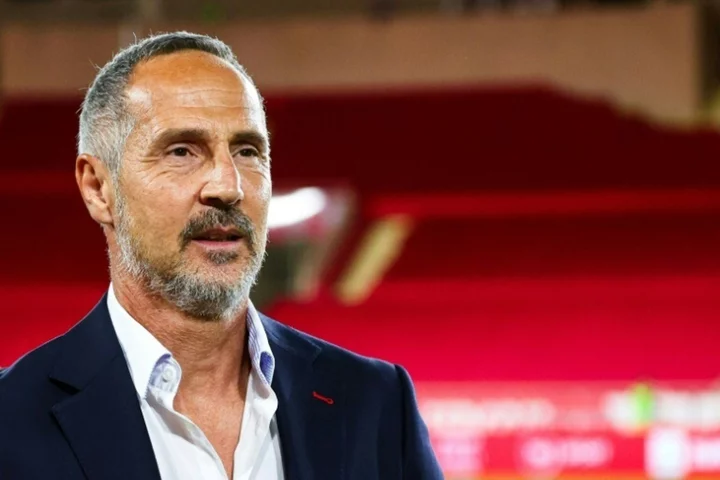
Hutter has 'lofty ambitions' with Ligue 1 leaders Monaco
New Monaco coach Adi Hutter says he has lofty ambitions with the French club after a blistering start to...
1970-01-01 08:00

Kenya fuel prices hit all-time high
The cost of fuel in Kenya hit a record high on Friday after the energy regulator revised pump prices, adding to the economic...
1970-01-01 08:00

Erik ten Hag discusses Antony & Jadon Sancho disciplinary breaches
Man Utd manager Erik ten Hag has discussed the issue of squad discipline with Antony and Jadon Sancho both currently away from first-team training.
1970-01-01 08:00
